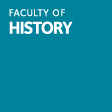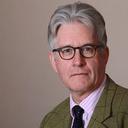Remembering Mark Whittow: Historian, Teacher and Friend Event
3rd November 2018
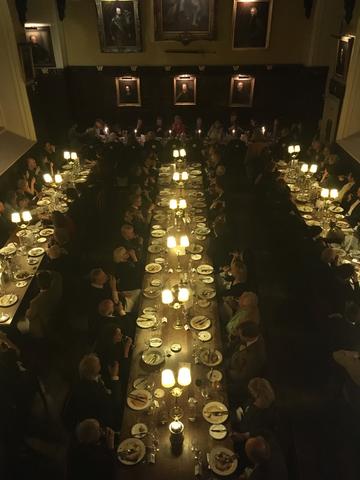
The final toast is drunk after Dr James Howard-Johnston’s speech
This was in many ways, a unique event. Three Oxford Colleges, St Peter’s, Corpus Christi and Oriel, united in hosting a day-long event that sought to combine a serious academic analysis of Mark’s research and teaching methods, with a public friendly celebration of his life, and irrepressible personality. So too are the colleges and departments Mark touched, allied for this next endeavour: fund raising in Mark’s honour, whether that be for a travel grant, a scholarship or a Junior Research Fellowship. While this event was the launch of that appeal, hopefully this report can convey a small sense of what it was like, and thus what Mark was like, such that future Oxford students and scholars can carry on his legacy. The full papers or notes from all speakers, along with this report, will be donated to the archives of all three colleges so that such wonderful words as were said will not be lost to time, and so that future historians, teachers and friends who follow Mark can also learn from them.
The conference section of the day was hosted in the stunning venue that is St Peter’s chapel, and the event began with coffee and words of welcome from Mark Damazer, Master of St Peter’s, focusing on the impact Mark had on St Peter’s SCR as well as on students. From there, Prof John Watts, Chairman of the history faculty and long-time sharer of a staircase with Mark at Corpus, recalled the delights of his daily morning coffee ritual with Mark, and his various contributions to the workings and future of the history faculty. Finally, Dr Maximilian Lau went through the logistics of the day, along with recalling advice from Mark. In particular: to apply to everything, and apply yourself to everything; that if you weren’t at least threatened with deportation you were not doing field work correctly; and thus, that you should always push the boundaries.
The first session of the day kicked off on Mark and Geography, chaired by Dr Catherine Holmes, who set the pace of the day by running around the chapel with the microphone to take questions and give running thoughts throughout. Dr Alice Taylor opened with ‘Mark and the West’, followed by Dr Nick Evans with ‘Mark and the East’, and finally Prof Chris Wickham with ‘Mark and the World’. All three papers picked up on how Mark was able to combine the specific, regional histories that made good (and often amusing) stories with the grand epic comparison involved in global history, and that for that reason, his analysis was all but unique. Specifically, the promise of his still forthcoming works was mentioned, so that like any legendary music star, the effect of his work will continue to redefine the discipline, as his papers continue to be published.
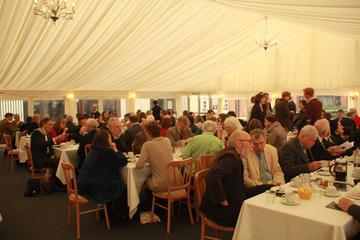
The packed Marquee from St Peter’s enviable lunch spread
With this session having set the tone, academic but amusing, with occasional moments of heartfelt tribute, the day was off to a flying start, with conversation in full swing as we retired to a nearby marquee for lunch. There was a wonderful buffet spread, all the more remarkable because fully 40 more people were present than had signed up for lunch. Our numbers were pushing 200 attendees at various points, and it is a true credit to St Peter’s that they rolled with this increasingly full house.
After lunch was the central Mark and Methodology session, chaired by the effervescently excitable Dr Neil McLynn. Dr Conrad Leyser opened the session by remarking on how Mark could bring the story of objects, seals and pots, to life, and as a central part of his analysis. This paper truly encapsulated what to many would seem a dull, side topic, but which to Mark became the inspiration for deeper historical thoughts as to the nature of sources and memory. Hugh Jeffery and Wiktor Ostasz, both all but finished with their own doctorates, then spoke on ‘Mark and the Landscape’, something any who knew Mark in any capacity would know was central to both his scholarship and his personality. They showed amusingly and accurately why Mark knew it was so important actually to visit the places mentioned in books, in order truly to understand history, beautifully marrying scholarship with anecdote of Mark’s own travels in Anatolia in particular.
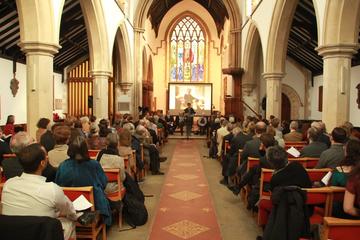
Dr Conrad Leyser speaks on ‘Mark, Sources and Memory’ during the Mark and Methodology session
Prof Dame Averil Cameron then spoke on ‘Mark and the Sacred’, probably the most difficult facet of his scholarship to analyse in its own category, but unsurprisingly for the author of so many foundational texts on Late Antiquity and Byzantium, both introductory and specialised, Prof Cameron framed Mark’s thoughts on iconoclasm and saints in ways even the man himself would have appreciated as superior, whilst also remarking upon Mark’s penchant for singing hymns at the top of his lungs. Both here, and in questions, Mark’s habit for dating University and Faculty minutes by Saints Days (the more obscure, the better) was also recalled fondly. Andrew Small, also finishing his DPhil now under Chris Wickham, then gave a paper on ‘Mark and Trade’ that encapsulated everything this event was about. He described Mark as: “a merchant adventurer prince, a diplomat, trader and mediator between worlds – travelling from city to city, eager to encounter new people and arguments, buying ideas only after carefully weighing and assaying the evidence, then putting them into new, thought provoking combinations before purveying them, through his writing, teaching or a hoot of a conversation. A product of his world, but changing and energising it as he travelled along.” Like Andrew, many of us count ourselves blessed to “have spent a few years travelling with him as one of his many apprentices, a member of his caravan. It was a wonderful and most profitable journey.” From such a growing litany of fantastic speakers, it would seem all but impossible to finish this session on a yet higher note, yet Dr Vivien Prigent succeeded, speaking on ‘Mark and the Scholarly Community’. Against stiff competition, his paper won the Most Amusing Paper Award, between his slides and his characterisation of how the French academic community in particular viewed Mark as everything they had hoped for, from a great British scholar. For those reading this, do look up the French cartoon Les Shadoks and the Gibis within it. As the winner of a karaoke contest in Poitiers for British honour, while sitting on the top French academic committees, and impacting greatly every conference and dig he visited, we can certainly agree with Christopher Lightfoot and Vivien that Mark was ‘a very decent chap’ - a characterisation identified by Vivien as the highest honour in Britain. Equally, he threw a spotlight, not for the last time of the day, on the synergy between Mark and Helen, Mark’s wife and partner in all endeavours, as well as between Mark and the many other scholars and students he encountered.
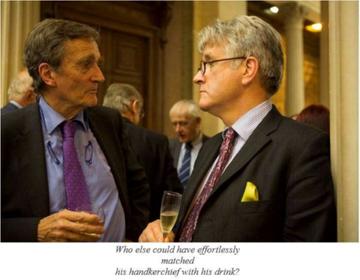
One of Dr Vivien Prigent’s many incredible slides from his ‘Mark and the Scholarly Community’ paper
The day entered the last conference session more full of energy than ever, as we engaged with ‘Mark and Pedagogy’, the flagship session and one which many of those present would point to as Mark’s true passion. Chaired by the ably inquisitive Dr Rowena Archer, friend and colleague of Mark’s since 1979, this session was explosive in its humour, and deep in its analysis as it sought to answer the question as to what exactly made Mark such an incredible educator, and one who inspired such affection and respect in both students and colleagues. The session opened with Dr Henrietta Leyser, Emeritus Fellow of St Peter’s and sous-chef to Mark at undergraduate reading parties, reading the ‘General History of Mark Whittow’, composed by Prof Lawrence Goldman, sadly missing but still very much a part of the event. This witty and educational piece has now been published in the Oxford Magazine, and I would direct any reader towards it, though Henrietta’s asides and extras took it to further heights. Thereafter we heard from a succession of speakers: colleagues Prof Holger Nehring and Dr Nicholas Cole, former students Arthur Downing and Lawrence Price, Edward Zychowicz-Coghill a former doctoral student and Adele Curness, still current DPhil and now supervised by James Howard-Johnston. For the wonders and perils they spoke of, I must direct all readers to the archive, but a number of common themes emerged, which itself was telling as it showed there was only Mark. We analysed how, rare in Oxford, Mark was truly encouraging, whatever your background or personal traits. He made you feel welcome and that you were actually good at what you did, in contrast to so much of the University which forever tells you that you are not good enough. Whether it was over cheese and wine in his house, coffee in his office, or even the occasional email, he encouraged and cared. Though his flaws were not overlooked (many in the room recalling palpitations as they awaited references that arrived only at 23.58 before the midnight deadline) they didn’t matter because of these traits.
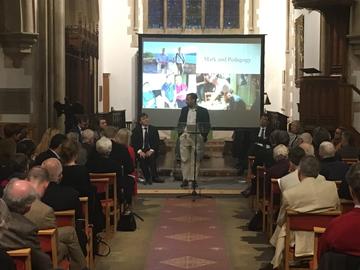
Mr Lawrence Price speaks during the Mark and Pedagogy session
In this session in particular, but in the others no less so, the contributions of the audience made the event. Moments were recalled when a question about Vikings actually led to a student not dropping out of university; when Mark and his Junior Proctor sang the Latin Litany in St Mary’s at dawn; when Mark suggested that a digitised Burke’s Peerage should be put through dog breeding software; or the gradual realisation that Mark did indeed deliberately ask stupid questions at seminars to make everyone feel more confident, and how even those much older than Mark learned from him: questions and comments from the audience enhanced the day. Maximilian Lau wrapped up this section by recalling how, just like the last defenders of Constantinople where the Emperor Constantine XI had gathered the best soldiers from around Christendom, so too were these speakers taking Mark’s legacy on into the future; and the day was far from over.
The next event was at Corpus Christi, where in the auditorium we were served a vast quantity of delicious fizz, upon which many guests commented. Corpus truly rolled out the red carpet for us. Naturally, this led to a hugely jolly atmosphere, of which Mark would have greatly approved. It was encouraging to see even more guests descend on the event, including his successors as proctors and the proctors’ office staff, more college heads past and present, and more professors than you could shake a stick at.
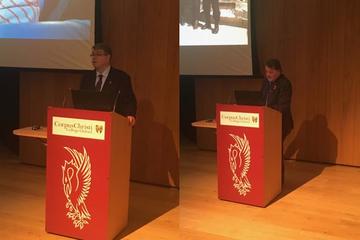
Lord Justice Peter Coulson and Mr Richard Onslow give their remarks at the Corpus Christi Wine Reception
At Corpus we were treated to three more casual talks, aimed at giving us some of the ‘missing links’ when it came to the real Mark: papers from school and undergraduate friends, and a paper on his involvement with student societies. Lord Justice Peter Coulson, a schoolfriend of Mark’s from the age of 14 in 1971, was introduced by Steven Jones, current Warden of St Edward’s, Oxford, who himself recalled his first impressions of Mark. Between these two they recalled the impact that being involved with dramatic productions had on the young Mark: in particular his performance in Oh, what a lovely war where Mark boomed out ‘we will attack the enemy here! At the clump of trees! Le Clump de Trees!’ stood out in many memories, along with a production at the Oxford Playhouse where Mark auditioned the audience as to whether they could chat, fidget and rustle their crisp packets sufficiently well. Complimentary to that were Mark and Peter’s travels around the Balkans and Anatolia, characterised by sending postcards back to their Latin master in the style of Pliny the Younger: “Dear Twajan, I just wanted you to know everything is going wonderfully here, thanks to your benign and enlightened rule…” We then encountered the undergraduate Mark from Richard Onslow, Orielensis and contemporary of Mark’s from those years. His tales of Mark’s handmade shoes to working in a pizza restaurant, of how he and a handful of Oriel historians under the late, great, Dr Jeremy Catto got up to both work and hijinks in the Codrington Library; of Mark’s culinary skills and his amusing lack of sports skills (‘the coordination of a drunken flamingo on the squash court’) were all illuminating. Flurry Wright and Francesca Griffin, former and current Masters of the Christ Church and Farley Hill Beagles, then gave a fully researched paper on what Helen would later that evening call ‘Mark as senior member for Oxford’s reactionary societies’. Flurry and Francesca had gathered thoughts and testimony from seemingly hundreds of current and past students on how Mark was welcoming and encouraging, and willing to talk about anything, to anyone, picking up many of the threads from the teaching session on how Mark truly believed in the holistic education; and that when all seemed lost, it would be Mark that would send you the only card wishing you luck in your exams. Maximilian Lau wrapped up the session by encouraging people, as Mark would have done, to talk to someone they did not know, and to laugh and share memories of the man in the run up to dinner. Naturally there is far more to say on all these papers than could possibly fit in this report. I can only encourage readers to consult the archive of papers.
From Corpus Christi, the evening moved to Oriel, where the staff had been absolute heroes all day, adding more and more places for dinner (indeed, but for their farsightedness, the organiser would not have eaten). The menu and the wine were both stellar, the conversation flowed as knights and dames mixed with current students, professors with newly minted doctorates, with the evening presided over by Helen, and the opening grace said by Mary Whittow. Helen spoke after the first course, commenting on everything from Mark’s sartorial choices to the effect Byzantinists had on the breakup of the USSR, in a speech only equalled by her own at the funeral. George Whittow raised a toast in thanks to all the speakers and guests, on behalf of both Mary and Flossy too. The closing speech of the evening, however, belonged to Mark’s own supervisor and fellow traveller, James Howard-Johnston. Brandishing Mark’s early undergraduate tutorial reports at one point to the hall’s ebullient entertainment, he remarked that he too had once, accidentally, received a tutorial from Mark when he offered to give a paper for him, and had to finish it in just a few hours. Such a coryphean paper thus ended the dinner in the best of forms, though Oriel was not yet done with us as port and coffee awaited in the Champney’s room, and conversation and good cheer lasted late into the night.
PROGRAMME OF EVENTS
Read the transcripts of the talks which took place on the day below:
St. Peter’s College
10:30am Coffee Reception
11am Opening Remarks
John Watts and Maximilian Lau
11:15am Session One: Mark and Geography
Mark and the West: Alice Taylor
Mark and the East: Nicholas Evans
Mark and the World: Chris Wickham
Chair: Catherine Holmes
12:30pm Lunch
1:15pm Session Two: Mark and Methodology
Mark, Sources and Memory: Conrad Leyser
Mark and the Landscape (‘Mark and the Mountain’): Hugh Jeffery and Wiktor Ostasz
Mark and the Sacred: Averil Cameron
Mark and Trade (‘the Material’): Andrew Small
Mark and the Scholarly Community: Vivien Prigent
Chair: Neil Mclynn
2:45pm Coffee
3:15pm Session Three: Mark and Pedagogy
Framing Remarks: Lawrence Goldman, read by Henrietta Leyser
Colleagues: Holger Nehring and Nicholas Cole
Former DPhil Student: Edward Zychowicz-Coghill
Current DPhil Students: Adele Curness
Lawrence Price (The Pedagogy of Mark Whittow) and
Arthur Downing (Holism, Trust, Globalism, Rigor)
Chair: Rowena Archer
Corpus Christi College
5.15pm Wine Reception
Undergraduate Friend: Richard Onslow
Student Societies: Flurry Wright and Francesca Griffin
Oriel College
7.15pm Dinner

